Best Water Pipes For Home (2024 Update)
Looking to upgrade your home with a new water pipe system? With so many options on the market, it can be overwhelming to know where to start. Choosing the right water pipes comes down to assessing your needs, budget and desired features.
When shopping for water pipes, you’ll want to consider the pipe material, diameter, pressure rating, and compatibility with your home’s plumbing system. Copper, PEX, and CPVC are common pipe materials, each with their own pros and cons. The pipe diameter impacts water pressure and flow rate. Pressure ratings indicate the maximum water pressure the pipe can withstand.
How will you use your new water pipes? Do you need pipes suitable for hot and cold water? Or are you looking to irrigate your lawn and garden? Do you have hard or soft water? These factors will help guide your decision.
What’s your budget? Pricing can vary greatly based on the pipe material and diameter. Consider both upfront costs and potential long-term savings from greater efficiency or durability.
Does ease of installation matter? Some pipe types like PEX are more DIY-friendly than others. Factor in tool requirements and skill level needed.
Ready to upgrade your home’s water delivery? With some strategic thinking about your needs and research on pipe options, you’ll be flowing in the right direction in no time. Reach out to a plumber if you need help deciding. Investing in the right water pipes will pay dividends for years to come through better water flow.
10 Best Water Pipes For Home
| # | Product Image | Product Name | Product Notes | Check Price |
|---|---|---|---|---|
|
1
|
The product is ideal for reducing hard mineral levels at the water source and improving water quality for various household activities.
|
|
||
|
2
|
The product is ideal for creating a DIY micro drip irrigation system using 10M PVC watering tubing with a 4/7mm diameter.
|
|
||
|
3
|
This product is ideal for a DIY micro drip irrigation system, using 4/7mm PVC watering tubing hose pipe.
|
|
||
|
4
|
The product is ideal for protecting water pipes from freezing in harsh weather conditions.
|
|
||
|
5
|
Preventing pipes from freezing in cold weather by providing reliable heat that melts ice and keeps water flowing.
|
|
||
|
6
|
Ideal for hot and cold water plumbing, open loop radiant floor heating systems, and non-barrier PEX tubing applications.
|
|
||
|
7
|
The product is ideal for use in temperature and pressure relief systems.
|
|
||
|
8
|
This product is ideal for connecting a water heater to a female iron water supply line.
|
|
||
|
9
|
Ideal for flexible water tubing in plumbing applications, made with PEX-B material and 3/4 inch diameter.
|
|
||
|
10
|
This product is ideal for use in plumbing systems with PEX pipes and PE-RT.
|
|
1. Smartclean Water Softener: Better Water, Less Salt
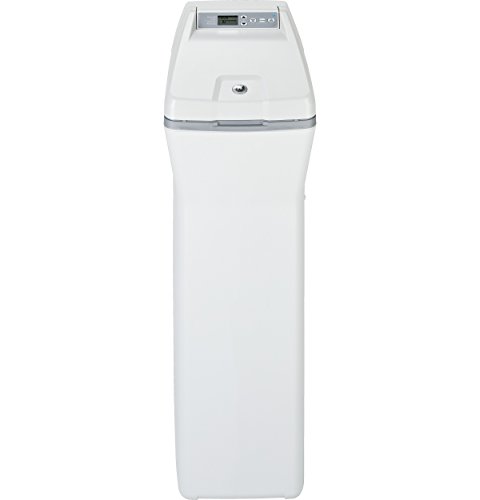
Introducing the GE Exclusive Water Softener with advanced features designed to provide you with the best soft water experience. This water softener offers a range of benefits that you won't find in other products on the market.
The GE Exclusive Custom Select Blending Valve is a unique feature that allows you to select how soft you want your water to be. With this valve, you can customize the softness of your water to suit your preferences.
Another exclusive feature of this water softener is the GE Exclusive Salt Saver. This feature helps to reduce salt consumption by up to 34%, compared to other GE water softeners manufactured prior to 2009. With less salt usage, you can save money on salt refills without compromising the quality of your soft water.
The GE Exclusive Days to Empty feature is another advantage that comes with this water softener. This unique feature ensures that you never have to guess when to refill the salt tank. It displays the number of days left until the salt tank needs refilling, making it easier for you to plan and avoid running out of soft water.
With the GE water softener, you can also save water. The product uses up to 35% less water compared to other GE water softeners manufactured prior to 2009. This means that you can enjoy the benefits of soft water while conserving water and reducing your water bills.
Finally, the self-cleaning sediment filter is a crucial element that protects your home's plumbing from dirt and debris. The filter automatically cleans itself, ensuring that your water remains clean and free from sediment.
2. 10m Pvc Watering Tubing Hose Pipe,4/7mm Diy Micro Drip Irrigation System,for
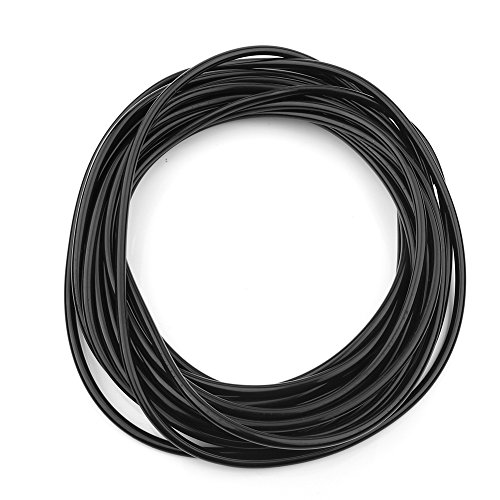
Introducing a new and environmentally-friendly drip irrigation hose that is made from high-quality materials, ensuring a long-lasting and durable product. The inner wall of the hose is smooth, allowing for a consistent flow of water with minimal waste.
This versatile drip irrigation hose is perfect for small flower pot projects on decks and patios, serving as the main supply line. It is also suitable for use in micro sprinkler, spray irrigation, and other micro spray products, making it an ideal choice for a variety of watering needs.
Crafted from solid poly materials, this micro hose is designed to be used with drip irrigation for both main and lateral water lines, making it a highly versatile and functional choice for agriculture, lawn, garden, and industrial irrigation needs.
Investing in this drip irrigation hose is a smart and sustainable choice for anyone looking to improve their watering practices while also being mindful of the environment. With its smooth and durable design, it is sure to provide long-lasting performance for all of your watering needs.
3. 20m Pvc Watering Tubing Hose Pipe 4/7mm Diy Micro Drip Irrigation System For
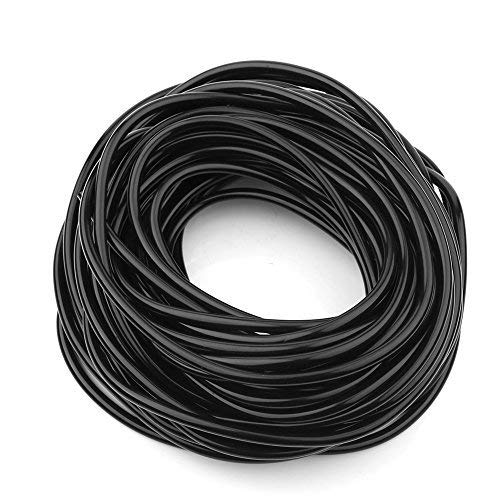
This solid polyethylene hose is an essential water-saving equipment for greenhouse and other irrigation applications. It is commonly used as a main and lateral water line in drip irrigation systems, as well as a supply line in small flower pot projects on decks and patios.
This drip irrigation hose is made using durable and new crafting techniques that make it ideal for water piping of micro irrigators, spray irrigation, and other micro spray products. It is also flexible and soft, making it suitable for use in agriculture, lawn, garden, and industry applications.
The automatic flexible hose is designed for DIY projects and is made of environmental protection material that is free from any unpleasant odor. The inner wall of the hose is smooth, making it easy to work with and durable. It is also anti-sun, which helps to prevent any damage from prolonged exposure to the sun. Additionally, it is not easy to age, meaning it will last longer and provide reliable performance for all your irrigation needs.
4. Freeze-Free Water Pipe Solution From Heatit
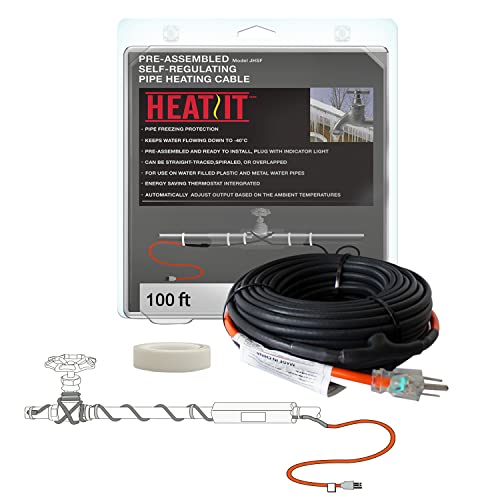
The JHSF heating cable is an effective solution for protecting water pipes from freezing temperatures. To ensure proper functionality, it is recommended to test the cable in a cold environment as it only operates below 37F/3 degree C. This product is a registered trademark of zhukeshi, and unauthorized sellers on Amazon.com are not authorized to distribute it.
This self-regulating heating cable is suitable for use on both plastic and metal water pipes, including inlet pipes, drain pipes, sewers, and palm tree frost protection. The cable's output will adjust automatically based on the ambient temperature at each point along the cable, making it an efficient and reliable solution for preventing pipes from freezing.
Installation of the pre-assembled cable is easy, and it comes with a grounded plug with light, built-in thermostat (turning the cable on at 37F and off at 50F), and instructions. The cable has a power rating of 3 watts per foot at 50 degrees F and can protect pipes up to 2 inches in diameter. It can be used for straight, spiral, and overlap installation.
The JHSF heating cable is ETL approved, and it includes a 2 ft 18/3 cold lead with plug. The cable's lowest installation temperature is -10 degree C. The inner insulation is made of tough XLPE, and the weather-resistant PE (high-low temperature) serves as the outer jacket. Ingress Protection 65 ensures that this cable can withstand harsh environmental conditions.
To ensure proper functionality, it is recommended to test the cable before installation. This product comes with a four-year limited warranty. If the customer is not completely satisfied, they may contact the manufacturer at any time.
5. Easyheat 2102 Freeze Free Heating Cable – 100'
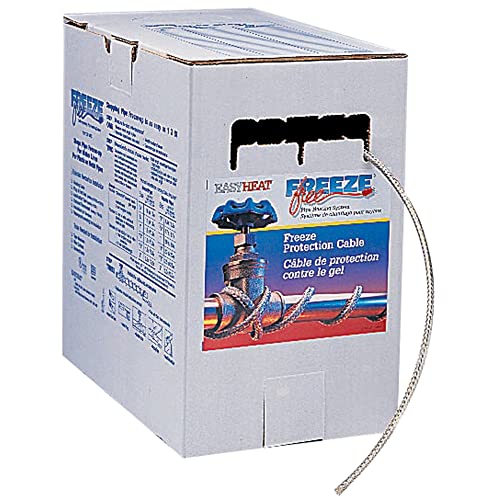
The Self-regulating pipe heating system is a reliable solution for preventing pipe freeze-ups, even in the most challenging conditions. This system offers flexible protection that automatically adjusts to match the requirements of the pipe and reduces power consumption when freeze protection is unnecessary. It is the perfect solution for safeguarding residential metal or plastic water supply and drain pipes that are subjected to freezing temperatures.
The system has a length of 100' and features a rugged metal braided jacket that provides an electrical ground and protection against potential damage. Its self-regulating feature ensures that it only consumes the required amount of power, making it an energy-efficient option for homeowners.
This pipe heating system is easy to install and can be customized to fit specific pipe lengths and configurations. The self-regulating element eliminates the need for a thermostat or other external control devices, making it a low-maintenance option for homeowners.
6. Hot & Cold Non-Barrier Pex Pipe: Happybuy
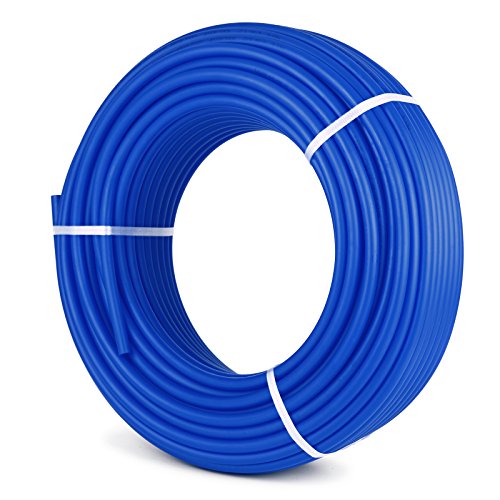
This PEX tubing is a reliable option for those looking for a material that can maintain quick and constant hot/cold water flows. It comes in a blue color with a nominal diameter of 3/4" and a total length of 500ft. Made of PEX material, it is crack-resistant and leak-proof, making it perfect for potable water or radiant floor water use.
The non-broken design of this tubing ensures a great sealing function that can tackle different weather circumstances, whether it be high temperature or cold days. It does not deform, thus ensuring integrity and safe use.
The tubing's premium flexibility is another added benefit. With a minimum bending radius of 7", it can easily bend for different ground situations. Its pressure rate is 188-217psi at 20℃ and 101-108psi at 95℃. It is compatible with water temperatures ranging from -45 to 110℃ (-47℉ to 230℉), ensuring good temperature resistance, crack and leakage-proof of the 3/4" PEX.
Installation of this tubing is effortless, as it is compatible with different connection systems and floor types. These include Crimp connection system (crimp tool + crimp rings + crimp fittings), Cinch (clamp) connection system (cinch tool + St. steel clamps + crimp fittings), Press system (by Viega), and Compression PEX Fittings.
This versatile tubing can be used for both home and commercial purposes, such as radiant floor heat systems, solar water heater systems, central air-conditioning piping systems, structural concrete slabs, non-structural slabs, staple-up (between joists) radiant floor heating with and without heat transfer plates, "Sandwich" type radiant heating (between sub floor and finished floor), and snow & ice melting systems.
7. Reliance 9002273-005 3/4-Inch T & P Discharge Pipe
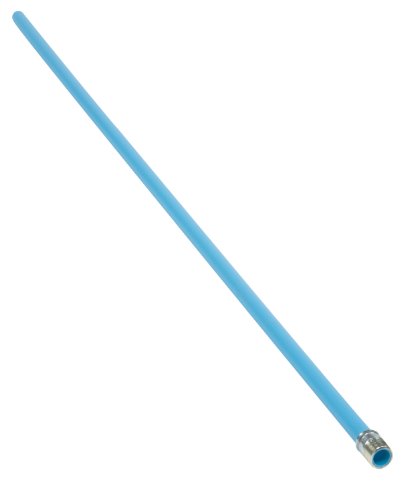
This discharge pipe is an essential component of any temperature and pressure relief valve system. Designed to attach seamlessly to the valve, the pipe measures 3/4-Inch in diameter and 55-Inches in length.
Crafted from PEC polymer, this discharge pipe is highly durable and built to withstand the toughest conditions. It's also lightweight, making it easy to install and handle.
The pipe's robust construction ensures a reliable and long-lasting performance, giving you peace of mind when it comes to your valve system.
Whether you're looking to upgrade your existing system or install a new one, this discharge pipe is an excellent choice. With its top-quality materials and superior design, it offers unbeatable value and reliability.
So why wait? Add this discharge pipe to your temperature and pressure relief valve system today and enjoy the benefits of a safe and efficient plumbing system.
8. Ez-Flex Stainless Water Heater Connector – 18
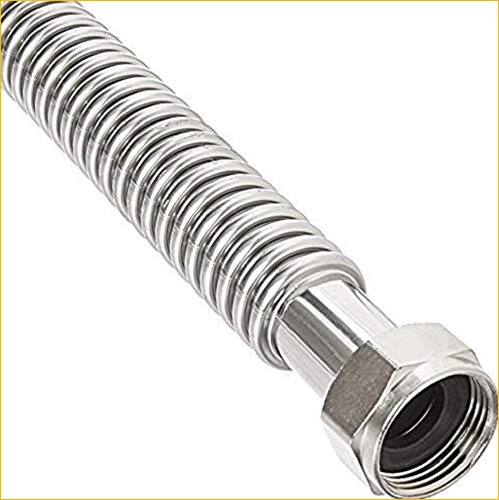
Introducing the Corrugated Flexible Stainless Steel Flex Connectors, specially designed for use with hot water heaters, tankless water heaters, and water softeners. These connectors are a must-have for anyone looking for a reliable and durable solution to connect their water heater or softener to their plumbing system.
Made from high-quality stainless steel, these connectors are both Lead-Free and UPC certified, ensuring that they meet all safety and quality standards. The FIP Female Water Pipes Connection on Both End Fits on All Steel Pipe with NPT Thread, making it compatible with a wide range of plumbing systems.
Available in lengths ranging from 12 inches to 24 inches, these water hose connectors are perfect for any size of water heater or softener. The flexible design allows for easy installation and ensures that the connectors can bend and move without kinking or breaking.
The swivel female threads connection to water heaters, softeners, Tankless Water Heaters, and more makes it easy to connect to your existing plumbing system. Plus, the corrugated design helps to absorb shock and vibration, reducing stress on your plumbing system and extending its lifespan.
9. Sharkbite 3/4 Inch X 100 Feet Blue Pex-B, Pex Pipe Flexible Water Tubing For Plumbing, U870b100
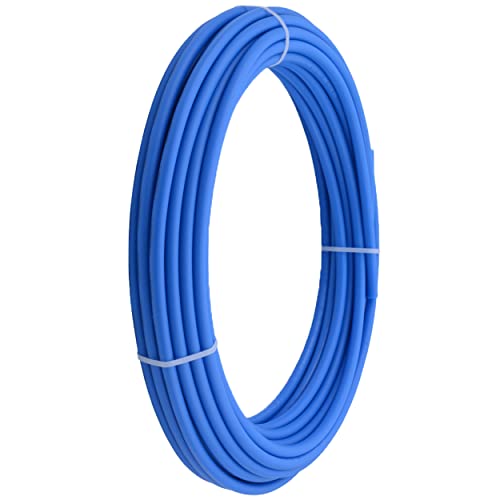
Introducing the SharkBite Blue PEX-B Pipe, an innovative and reliable solution for your water distribution needs. With its coil length of up to 1,000 feet, this flexible PEX tubing allows for longer runs and fewer connections, which translates to cost savings, convenience, and reduced potential leak points.
The SharkBite Blue PEX-B Pipe is specially designed to withstand freezing temperatures and thawing cycles, making it an ideal choice for hot and cold potable water distribution, fire protection, and municipal water service lines. Its innovative push-to-connect design offers faster and easier installation compared to rigid pipes, without compromising on strength and durability.
This portable PEX pipe is preferred by professionals and is certified to meet ASTM F2023 oxidative-resistance requirements for continuous hot water recirculation. It is approved for water service lines and burial applications, including being buried under concrete.
When it comes to specifications, the SharkBite Blue PEX-B Pipe boasts a minimum working temperature of 33 degrees F at 160 PSI, a maximum working temperature of 200 degrees F at 80 PSI, and a maximum working pressure of 160 PSI at 33 to 70 degrees F. It also has a six-month UV resistance and the highest-rated chlorine resistance, ensuring longevity and reliability for your water distribution needs.
10. Sharkbite 1/2 Inch Crimp Multi-Turn Straight Stop, Brass Plumbing Fitting, Pex Pipe, Pe-Rt, 23063lf
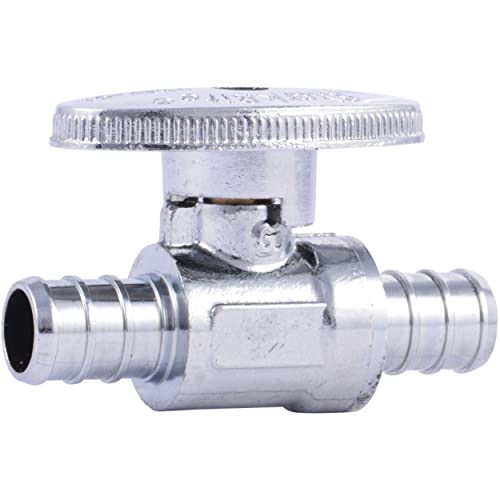
The SharkBite Multi-Turn Straight Stop Valve is an essential component for any plumbing system. This valve allows for easy shut-off of water flow to the end fixture, making maintenance and repairs a breeze without having to turn off the water supply to the entire home.
This crimp stop valve is compatible with PEX and PE-RT pipes, making it a versatile option for various plumbing systems. It connects to PEX pipes with copper crimp rings or stainless steel clamps, ensuring a secure and leak-free connection.
Crafted from lead-free DZR brass, these brass crimp straight stop valve fittings are highly durable and reliable. Typically used on stub-outs coming out of the wall, these fittings are designed to withstand the test of time and provide long-lasting performance.
The SharkBite Multi-Turn Straight Stop Valve is preferred by professionals in the plumbing industry. SharkBite tools and fittings meet the same high standards for commercial and residential plumbing applications, providing a combination of durability and ease of use. These valves are certified for use in potable water system applications, ensuring that they meet the highest standards for safety and quality.
In terms of specifications, SharkBite brass fittings feature a minimum working temperature of 33 degrees F at 160 PSI and a maximum working temperature of 200 degrees F at 80 PSI. This ensures that they can handle a wide range of temperatures and pressures, making them suitable for a variety of plumbing applications.
Best Water Pipes For Home FAQs
Are copper pipes better than PVC pipes for home water supply?
When it comes to choosing between copper and PVC pipes for home water supply, there are several factors to consider. Copper pipes are durable, have a long lifespan, and are resistant to corrosion. They are also a good conductor of heat, making them ideal for hot water supply. On the other hand, PVC pipes are lightweight, easy to install, and less expensive than copper pipes. They are also resistant to chemicals and do not corrode like copper pipes.
In terms of safety, both copper and PVC pipes are safe for drinking water supply. However, some studies have shown that copper pipes may leach small amounts of copper into the water, which can cause health problems in people with high copper sensitivity.
Ultimately, the choice between copper and PVC pipes will depend on your specific needs and preferences. If durability and heat resistance are a priority, copper pipes may be the better choice. If cost and ease of installation are more important, PVC pipes may be the way to go. It's always best to consult with a professional plumber to determine the best option for your home water supply.
Are there any eco-friendly options for home water pipes?
Yes, there are eco-friendly options for home water pipes that can help conserve water and reduce waste. One option is to install low-flow showerheads and faucets, which can significantly reduce the amount of water used in the bathroom. Another option is to replace older toilets with low-flow models that use less water per flush.
Additionally, there are water filtration systems available that can help reduce the amount of water wasted in the home. These systems can help remove impurities and contaminants from the water, making it safe to drink and reducing the need for bottled water.
Finally, it is important to properly maintain your home's plumbing system to prevent leaks and water waste. Regularly checking pipes and fixtures for leaks and repairing them promptly can help save water and reduce your home's environmental impact. By incorporating these eco-friendly options into your home, you can help conserve water and reduce waste while still enjoying the convenience and comfort of modern plumbing.
How can I prevent my home water pipes from freezing in winter?
During the winter months, it is common for water pipes to freeze, leading to burst pipes and costly repairs. Here are some steps you can take to prevent your home water pipes from freezing in winter:
1. Insulate your pipes: Insulate any pipes that are exposed to cold air with foam insulation sleeves. This will help to keep the pipes warm and prevent freezing.
2. Keep your home warm: Make sure your home is consistently heated to at least 55 degrees Fahrenheit. This will help to maintain a warm temperature throughout your home and prevent pipes from freezing.
3. Let faucets drip: When the temperature drops, let faucets drip to keep water flowing through the pipes. This can prevent water from freezing inside the pipes and causing damage.
4. Seal any gaps or cracks: Check for any gaps or cracks around windows, doors, and pipes and seal them with caulk or insulation. This will help to keep cold air out and maintain a warm temperature inside your home.
By taking these steps, you can prevent your home water pipes from freezing in winter and avoid costly repairs.
How do I choose the right diameter for my home water pipes?
Choosing the right diameter for your home water pipes depends on various factors such as the amount of water pressure you need, the number of fixtures or faucets in your home, and the distance between the main water supply and your home. To ensure an adequate and consistent water supply, it is important to select the right diameter for your pipes.
For instance, if you have a larger family and multiple bathrooms, you will need a larger diameter pipe to accommodate the higher demand for water. Similarly, if your home is situated far from the main water supply, you may need a larger diameter pipe to ensure adequate water pressure.
It is recommended that you consult a professional plumber or engineer to help you determine the right diameter for your home water pipes. They can assess your specific needs and recommend the appropriate pipe size and material that will meet your requirements and ensure a reliable water supply for your home.
How do I maintain and clean my home water pipes?
Maintaining and cleaning your home water pipes is essential for ensuring a steady flow of clean water and preventing the buildup of minerals that can cause blockages and damage over time. Here are some tips:
1. Regularly flush your pipes: Turn on all the faucets in your home and let the water run for a few minutes. This will help to flush out any sediment or debris that has accumulated in your pipes.
2. Use a water softener: If you live in an area with hard water, consider installing a water softener. This will help to remove minerals that can build up in your pipes over time.
3. Avoid harsh chemicals: Harsh chemicals can damage your pipes and cause corrosion. Instead, use natural cleaning solutions like vinegar and baking soda to clean your pipes.
4. Regularly inspect your pipes: Check your pipes for signs of leaks or damage. If you notice any issues, contact a professional plumber to assess the situation.
By following these tips, you can help to ensure that your home water pipes remain clean and in good condition for years to come.
What are the advantages of PEX pipes for home water systems?
PEX pipes, or cross-linked polyethylene pipes, have become increasingly popular for home water systems due to their many advantages. Firstly, PEX pipes are flexible, making them easy to install in tight spaces and around corners without the need for additional fittings, reducing the risk of leaks. They also have excellent resistance to heat, freezing, and corrosion, making them a good choice for harsher conditions and reducing the likelihood of pipe failure. PEX pipes are also more affordable than traditional copper pipes, and their installation requires less time and labor, leading to cost savings. Additionally, PEX pipes have been shown to improve water quality by reducing the levels of lead and other contaminants that can leach into water from older, corroded pipes. Overall, the use of PEX pipes can provide homeowners with a more efficient, cost-effective, and safer water system.
What are the best materials for home water pipes?
When it comes to choosing the best materials for home water pipes, there are several options available in the market. However, some materials are considered better than others in terms of durability, safety, and cost-effectiveness.
One of the most popular materials for home water pipes is copper. Copper pipes are known for their durability, resistance to corrosion, and ability to handle high water pressure. They are also easy to install and maintain, making them a popular choice for many homeowners.
Another option is PEX (cross-linked polyethylene) pipes. PEX pipes are flexible, making them easy to install in tight spaces. They are also resistant to corrosion and scale buildup and have a long lifespan. However, they can be more expensive than copper pipes.
CPVC (chlorinated polyvinyl chloride) pipes are also a common choice for home water pipes. They are cheaper than copper and PEX pipes and are resistant to corrosion and scale buildup. However, they are not as durable as copper or PEX pipes and may require more maintenance.
Ultimately, the best material for home water pipes will depend on your specific needs, budget, and preferences. It is always best to consult with a professional plumber to determine which option is best for your home.
What are the most common causes of leaks in home water pipes?
The most common causes of leaks in home water pipes can vary depending on the age and condition of the plumbing system. However, some of the most common causes include corrosion, high water pressure, temperature changes, and damage from freezing temperatures. Corrosion can occur over time and weaken the pipes, causing them to leak. High water pressure can cause stress on the pipes, leading to cracks and leaks. Temperature changes can also cause pipes to expand and contract, which can weaken them and lead to leaks. Finally, freezing temperatures can cause the pipes to expand and burst, especially if they are not properly insulated. Other causes of leaks may include improper installation, damage from tree roots, and wear and tear from everyday use. It is important to address any leaks as soon as possible to prevent further damage and potential water damage to the home.
What are the most reliable brands for home water pipes?
When it comes to choosing the most reliable brands for home water pipes, there are several options available in the market. Some of the well-known and trusted brands for home water pipes include Uponor, SharkBite, Viega, and NIBCO.
Uponor is a popular choice for its flexible and durable PEX piping system, which is highly resistant to corrosion and freezing. SharkBite is another reliable brand that offers easy-to-install push-to-connect fittings that can be used with copper, PEX, or CPVC pipes.
Viega is known for its press-fit technology that provides a secure connection between pipes without the need for soldering or gluing. They offer a range of materials such as copper, stainless steel, and PEX.
NIBCO has been in the plumbing industry for over 100 years and is a trusted brand for both residential and commercial plumbing systems. They offer a wide range of products including copper, CPVC, and PEX pipes.
It is important to note that the reliability of a brand can also depend on the specific product and the installation process. It is always recommended to consult with a professional plumber to ensure that the right materials are used and the installation is done correctly.
What is the average lifespan of home water pipes?
The average lifespan of home water pipes depends on various factors such as the type of material used, water quality, usage frequency, and maintenance. Typically, copper pipes can last up to 70-80 years, while galvanized steel pipes can last up to 80-100 years. Plastic pipes, such as PVC and PEX, have a lifespan of 25-40 years. However, these numbers can vary significantly depending on the above-mentioned factors.
Water quality plays a significant role in determining the lifespan of water pipes. Hard water with high mineral content can cause corrosion in copper and steel pipes, reducing their lifespan. Frequent usage and high water pressure can also contribute to pipe degradation.
Regular maintenance can extend the lifespan of water pipes. Flushing the pipes, inspecting for leaks, and repairing them promptly can prevent further damage and prolong the lifespan of the pipes.
In summary, the lifespan of home water pipes varies depending on several factors, but with proper care and maintenance, they can last for many years.







